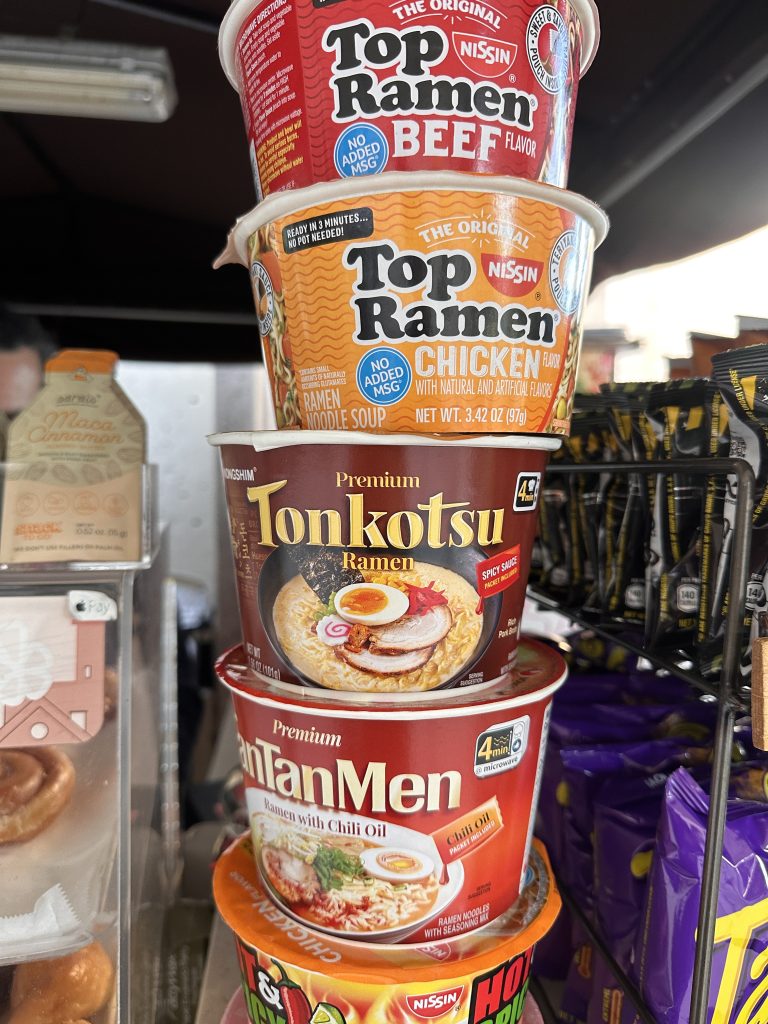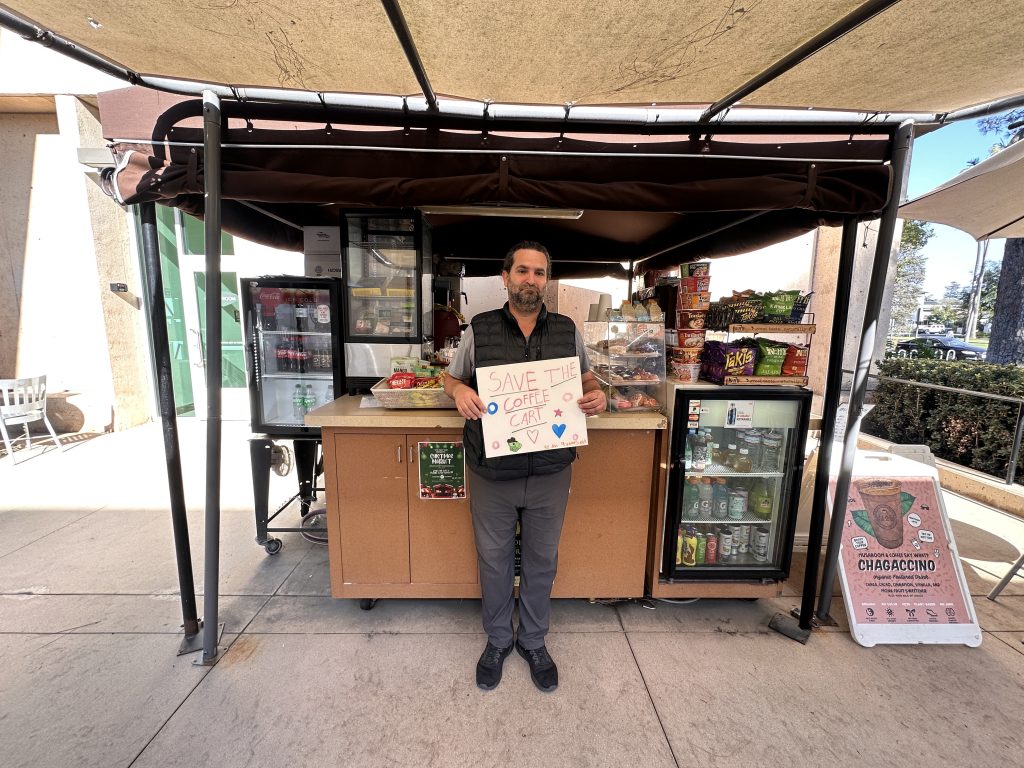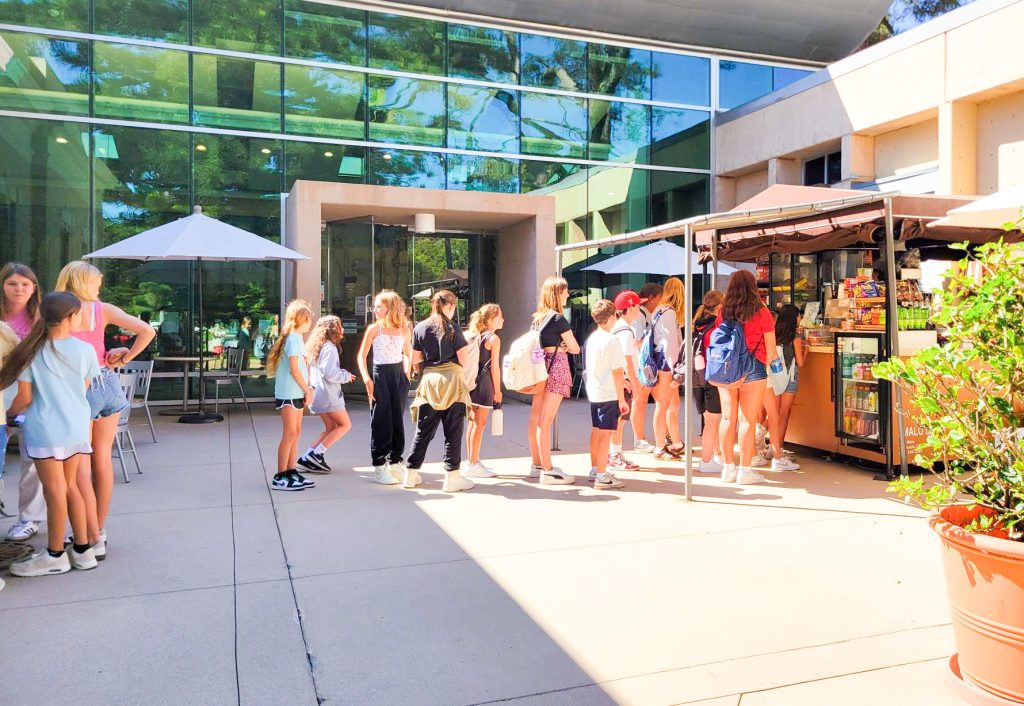For Alex Malo, owner of the coffee cart at the Coronado Public Library, it was never about the money. After all, most of his clients aren’t necessarily big spenders…they’re the kids of Coronado.
Every day around lunchtime and when school gets out in the afternoon, kids from elementary school all the way up to high schoolers line up outside of the cart. They buy everything from ramen and Takis to iced vanilla lattes and Boba Tea.

Malo likes the job because of his connection with the kids. He gets to keep an eye on them, including his own children; one attends Village Elementary and one goes to Coronado Middle School.
“I don’t make a lot of money,” said Malo, who has been running the cart for eight and a half years. “It’s a labor of love. I’m here for them. I see the smiles, and it’s worth it.”
For Coronado High School junior Chloe Barry, a stop at the coffee cart—called Amalo Brew-—is a regular part of her day.
“For countless students like me, Alex’s coffee cart is vital to our high school experience,” said Barry. “Students are drawn to the convenient location at the library. It’s a spot where we grab lunch and engage in our studies in a welcoming space.”
CHS student Drew Russell says the coffee cart is an easy, fun and affordable place to meet up with friends.
“It’s the most affordable place on the island to get lunch, and it’s close to the school,” said Russell. “We don’t get a super long lunch break, and Vons is expensive. And Alex is just a really genuine guy and he really cares about the kids he sees every day.”
Resident Karry Bradshaw Hill calls Malo a “gem” and says he’s an important part of the student community.
“For some of those kids he’s a hot meal,” said Hill. “He’s the difference between starving until pickup or eating. He looks out for the kids and lets prices slide so they get something to eat.”
But it looks like Amalo Brew’s days are numbered. According to Malo, the City of Coronado is terminating his contract. He says his last day will be sometime after the New Year.
A representative from the City sent The Coronado Times an email saying that “the current operator of the coffee cart has only been able to offer limited hours of operation, and the City of Coronado is interested in expanding coffee cart hours to better serve library patrons.”
The City’s email also referenced “outstanding permit issues.”
According to Malo, the trouble started a couple months ago when the City started asking him for paperwork, including his insurance, documentation from the Health Department, his food manager’s license and his business license. Malo said he turned in all his paperwork.
Then they asked him to expand the hours the coffee cart is open. Currently, Malo runs the cart from 11:15 am to 4 pm, Monday through Friday. The city asked him to open up the cart Monday through Friday, 9:30 am to 5:30 pm, and weekends.
But he says opening more hours wouldn’t make sense for his business.
“When there is no school, my sales drop completely,” he said. “90% of my customers are moms, parents and teachers. Almost everyone is connected to the schools.”
Malo also works as a server for the Marriott, and has to be at his job at 5 pm. And he works the coffee cart alone. He doesn’t have any employees.
“I’m a one man show,” he said. “If there was business during those extra hours, I would be open for business. But at that point it’s taking money out of my pocket.”
He said he invited the city to take the keys and run the coffee cart when he can’t be there, but they weren’t interested.
Councilman Casey Tanaka said that Malo had eight years to refine his operations, and the current council feels like a better coffee cart operation might be found through a new RFP (Request for Proposal).
“I think the council wanted a more consistent concessionaire in terms of hours of operation,” said Tanaka. “I don’t mind a concessionaire who caters to youth, but a coffee cart should be able to offer consistent morning hours and weekend hours, in addition to focusing on when the kids are leaving school.”
Carl Luna, from Coronado Friends of the Library, says that he and other FOL members have received multiple complaints from library patrons about what he called “erratic” hours.
“[They said] that it seems like the [coffee cart] is only open when the high school and middle school kids are getting out of school, and that it’s been closed for extended periods during school breaks and summer vacation, and that the service is slow and the product line is not particularly appealing,” said Luna.
Luna says there is no intention by the city to eliminate the coffee cart; but that it wants to find the highest quality vendor who can operate effectively in front of the library, both as a public amenity and as a consistently open draw for bringing people into the library.
“The library has nothing to do with this process,” said Luna. “It’s under the purview of the council and the city manager.”
Luna says that having a coffee cart at the library provides value, offering residents and visitors a nice setting for a quick cup of coffee. Instead of the old idea, “No food or beverage in the library,” libraries are encouraging patrons to come and linger over coffee and an “incredible selection of books and holdings,” according to Luna.
“For the coffee cart to work in this capacity, it needs to be open regular and consistent days and hours, offer speedy service and provide options that serve all ages of the public who go to the library and not just appeal to the tastes of middle and high school students,” said Luna. “As is, the coffee cart seems to be run on an ad-hoc basis according to the whims of the current vendor, which is itself a violation of the terms of service the vendor agreed to with the city.”
But Malo says when he started Amalo Brewing in 2016, he agreed to the terms set by the City of Coronado. He said he had an agreement with the prior City Manager, Blair King, and the assistant city manager.
“They said, ‘here is your schedule,’ and they gave me a schedule and I complied,” he said.
Malo says when he bought his coffee cart and moved into the space eight and a half years ago, there was no one working the spot. He says he was about the 10th vendor who tried to make it work.
“When I first started, I thought I struck gold, I thought I was going to make money,” he said. “Then I realized after consistently making $45 in sales a day, it wasn’t about the money. And I started to realize the impact I was having on the kids. And I was like, you know, I think this is going to be better.”
Then there’s the problem of the permit fee required by the city. Malo says his earnings were so dismal when he opened that his permit fee was waived in a verbal agreement, and that the city did not reach out to him for payment or issue him an invoice until recently. He said he would pay the back fees, but the city told him to hold off.
Then they sent him the termination letter about a month-and-a-half ago. Malo says they terminated his contract under the “convenience clause,” which means it can be terminated for any reason. He has appealed this decision.
“If you want me to leave, just tell me,” he said. “Don’t tell me that it’s because I’m not compliant, and that I never paid.”
The news isn’t going over so well with many residents, especially the students.
“Losing this coffee cart would be more than just losing coffee…it would strip away a cherished tradition from the community,” said Barry.
“I’m heartbroken the city would shut down something that is so popular and needed by the community, and especially the students,” said Russell.
Malo says he’s the only coffee cart vendor who’s been able to last so long at the location. He says it would be a struggle for anyone to run a business there with the longer hours required by the city.
He admits maybe a big company could do it, like a chain.
“Who can afford to do it?” he asked. “Companies who have money.”
For community members like Christy Curran and Maureen Fitzgerald, this would be a huge loss.
“I regularly go to the coffee cart in the afternoon to witness all the activity around Alex and his cart,” said Curran. “Alex has a made a warm an inviting place for kids to gather after school or while studying. He has a natural rapport with the kids. This is not the place for a chain.”

For Fitzgerald, whose high school daughter is one of Malo’s longtime customers, the coffee cart is the heartbeat of the student community.
“He makes our space more joyful,” said Fitzgerald. “He’s someone the kids can count on being there, and a lot of kids don’t have that.”
Malo says he’s has accepted the city’s decision, but he’s worried about the students, including the two kids he mentors through the Accessibility Program, which helps young people with disabilities age 16-20 work real-life jobs.
“These kids are only allowed to have one job a school year, so come January, they’ll have nothing,” he said.
Malo says he appreciates the kind words from residents who stop by. Some even make him signs and have taken to social media to show their support.

“It all started with this sign made by a nine year old,” he said. “If this little girl can start all this commotion, something isn’t right.”
But he says no one is above the law, and if the city wants him to leave, he’ll leave.
“I’ve already gone through all the stages of grief,” he said. “At the end of the day, if the city doesn’t want me to be there, it’s not going to happen. But I’m going to sleep at night knowing I tried as much as I could.”
Editor’s note: Originally Malo’s last day was to be December 31st, but he says this has changed to sometime in January or February.






If the Coronado Library wants expanded service, why not offer some funding? Alex has obviously “refined” his business to focus on where he will make profit: the students of Coronado.
I suggest that Carl Luna and Casey Tanaka buy each other coffee at Malo’s.
The city won’t find a corporate vendor for the little profit the business stands to make – let’s get real. It’s unreasonable to ask anyone to offer these services, knowing that they will not make money. Disappointing attitude toward the vendor, considering these glaring and obvious facts – especially since this has been a pattern on repeat, with all the previous operators. The school is what keeps the business afloat – as stated in the article. The city is willfully ignoring this crucial detail.
Don’t forget all the Winn Room meetings that have enjoyed Mall’s coffee service
As a new resident to Coronado this year, I truly find the “character of Coronado” is reflected in it’s residents making thoughtful decisions driven by the heart and not the dollar sign. Malo sustains the lifeline and flavor for the community. Please don’t change that…it’s so rare to experience the magic Coronado has created here.
As a new resident to Coronado this year, I truly find the “character of Coronado” is reflected in it’s residents, in making thoughtful decisions driven by the heart not the dollar sign. A mindset that sustains the lifeline and flavor for the community. Please don’t change that…it’s so rare to experience the magic Coronado has created here.
John Charles 12/18/2024 at 4:45 pm
I find it interesting it has taken 8+ years for these reported complaints to surface? Otherwise,
it seems reasonable to assume the community was satisfied with this one man operation??
It’s shocking to see how blatantly the City Council is showing their greed over their desire to actually improve the community. This stand IS one of the last shreds of what makes Coronado a community. The fact of the matter is that even if they bring someone in to run a cart during those two extra hours (that will have little to no business) that spot makes such little money that whoever runs it would have to have their own wealth already. Meaning a chain. So we’re shutting down a local businessman to bring in a chain, and this is going to “improve” the community? You’re never going to find another man like Alex, someone who genuinely gives up his money and time JUST for the community, for the kids, without a complaint. Clearly the City Council knows nothing about choosing a path for the community where money isn’t the only motive. There are probably ten other coffee shops on the island, it’s not like there’s nowhere else for a person to get coffee at 9am. This was for the kids. I’m appalled that a high school teacher like Tanaka is leading this change when it’s the children he teaches that use this spot as a safe, cheap, and reliable place to eat.
The coffee cart leaving Coronado would literally be the last “f you” to the students in the school district. You can’t hire a half decent vice principal, you regularly pull kids over for biking on sidewalks, and now you’re trying to close the one place left where students can actually be centered. This proves just how classist the city of Coronado truly is.
As a longtime resident of Coronado — with a family who thoroughly embrace our library — I must admit that the current “Coffee Cart Vendor,” has not been a good fit for the City’s required “Scope of Services” that were clearly spelled out to those who intended to submit their RFP (Request for Proposal) for consideration.
Too, the current cart operator’s physical cart go as morphed into something that resembles “7/11 AM/PM-type store operation” with akin pricing.
Let’s get a new round of “Requests for Proposals” going, and find a vetted operator who can meet and/or exceed the contacted requirements set forth.
I’ve enjoyed lattes and other drinks there. I don’t think it’s necessary to stay open past 4 pm.
But if there’s not enough business during school breaks another cart will face the same financial challenges as the present cart, perhaps overcharge, and nothing good will result from this change.
This coffee cart is a great little place to goto in the day and the owner is very nice but when you live in a liberial place what do you expect? Lately Coronado has been running everyone out of business because they want to be another La Jolla. Case and point Wine A Bit, was a staple business for years and the city has got so greedy about money they doubled the rent. Same goes for renting a place to live, everyone is so greedy here money is all they care about.
I have enjoyed the coffee cart. You just never know if it will be open or not. It’s difficult to see if it’s open from Orange Avenue as I drive by so I stop elsewhere to pick up coffee to bring into the library. It’s tucked away in a shaded sea of concrete. Seems like a fixable issue: Better signage, placement and promotion.
That’s an excellent suggestion. Better signage. Also – most coffee shops in downtown close at 330. If he has operated the longest, and his biggest patrons want him to stay, I don’t understand the City’s move. If it’s vacant then what? Now there is no coffee cart and the people complaining about hours have nothing. As a middle and high schooler, I spent my afternoons at the library. Anything that keeps kids at the library rather than out of trouble should stay. Keep the cart for the kids.